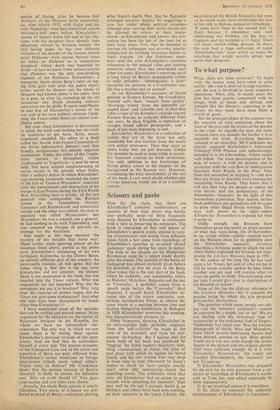Scissors and paste
Now for the claim that these are Khrushchevi authentic reminiscences, an analysis of their style shows that hardly any—probably none—of these fragments were dictated by Khrushchev in retirement with a view to preserving his memories. The book is concocted of bits and pieces of Khrushchev's spoken words, uttered in vary- ing circumstances and dating from different times. Quite a few come from recordings of Khrushchev's speeches to so-called 'closed audiences' made during his years in power. The bulk of the chapter on the Hungarian Revolution must be a report made shortly after the events. The account of the battle of Stalingrad was almost certainly given before his downfall, as was the story of the Beria affair (since this is the only part of the book where he suddenly, and consistently, refers to Molotov, Malenkov, Bulganin and the rest as 'Comrades', it probably comes from a speech made before the 'Comrades" final disgrace). I myself heard• Khrushchev re- count one of the minor anecdotes, con- cerning Academician Paton, in almost the same words at a meeting between him and leading Hungarian intellectuals in Budapest in 1958 (Khrushchev mentions this meeting, but characteristically misdates it).
Other fragments, showing Khrushchev in an unfavourable light, probably originate from the 'self-criticism' he made at the time of his downfall, and from his sub- sequent 'de-briefing'. But I believe that the main body of the book was produced by 'bugging' the fallen leader's desultory, ram- bling conversations at home, the tales of past glory with which he regales his bored family and the few cronies who may drop in from time to time, Obviously he doesn't bother to check his facts—people usually don't while idly reminiscing—hence the appalling errors. The publishers claim that poor old Khrushchev had no access to any records while compiling his 'memoirs', That may well be (the ugh I strongly doubt it, as Molotov and others have been seen working on their memoirs in the Lenin Library, the
equivalent of the British Museum), but even so he could easily have established the date of his visit to Britain, instead of remarking: 'It must have been in the second half of April because I remember very well celebrating my birthday on the way to England, and my birthday is 17 April.' There are many similar telling phrases. In short, the KGB had a huge collection. of taped -'Khrushchevilma' from which to make the selections that would, suitably edited, best serve their purposes.










































 Previous page
Previous page